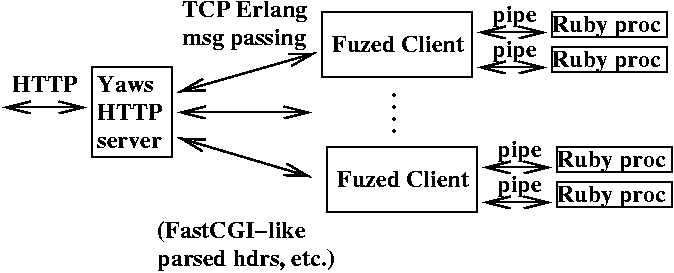Ruby and Erlang, Talking to Each Other
A presentation for Ruby Users of Minnesota, March 2008.
OSS Packages Currently Available for Ruby/Erlang Communication
- RBridge, https://rubyforge.org/projects/ruby-mnesia/
- Get the source, gem doesn't install correctly (on Linux/x86 at least)
- Erlectricity, https://rubyforge.org/projects/erlectricity/
- Originally at Google Code, but now out-of-date!
-
gem install erlectricity
- Fuzed, use Erlang's Yaws HTTP server for Rails
- Uses Erlectricity
- http://fuzed.rubyforge.org/
Erlang<->C Communication
- Via an Erlang "driver" port
- External process, communicate via pipes, all comm is serialized
- Safe (can't crash Erlang VM), slow (pipe data xfer, OS context switching, etc.)
- Shared library loaded into Erlang VM's memory space
- Fast, unsafe, must still use driver port API to serialize data in both directions (mostly true)
- External process, communicate via pipes, all comm is serialized
- "C-node", a process that implements the Erlang message passing protocol
- C-nodes look exactly like Erlang nodes
- Via TCP, UDP, SCTP, files, named pipes, ....
RBridge, Simple Communication
- TCP client-server design, no chicken-and-egg problem
- Basic design (if it were glue to Ruby instead): TCP server for "irb"
- Data conversion to Erlang: ASCII
- Data conversion from Erlang: ASCII S-Expression formatting -> Ruby types
- Data type conversion is limited, several Erlang types unsupported
RBridge Example
% /usr/local/lib/ruby/gems/1.8/gems/rbridge-0.1.2/rulang_server/rulang 9900 &
[RBridge Server Started]
% irb
irb> require 'rbridge'
=> true
irb> a = RBridge.new(nil, "localhost", 9900)
=> #<RBridge:0xb7f0ac14 @erlang=#<ErlangAdapter:0xb7f0ab38 @host="localhost", @port=9900>, @mod="erlang", @async=false>
irb> a.erl("[70, 71, 72].")
=> "FGH"
irb> a.erl("[70, 71, 172].")
=> "FG\254"
irb> a.erl("[70, 71, 272].")
=> [70, 71, 272]
irb> a.erl("length(erlang:processes()).")
=> 22
irb> a.erl("erlang:processes().")
RuntimeError: [Error]=>Error: {function_clause,[{local,to_ruby,[<0.0.0>]}]}
from ./rbridge.rb:77:in `erl'
from (irb):3
irb> a.erl("spawn(fun() -> ets:new(slf, [set, named_table, public]), receive die -> ok end end).")
RuntimeError: [Error]=>Error: {function_clause,[{local,to_ruby,[<0.68.0>]}]}
from ./rbridge.rb:77:in `erl'
from (irb):25
irb> a.erl("ets:insert(slf, {\"scott\", 39, \"louise\"}).")
=> "true"
irb> a.erl("ets:lookup(slf, \"scott\").")
=> [["scott", 39, "louise"]]
RBridge Data Conversion To Ruby
| Erlang Type | Ruby Type |
|---|---|
| atom | string |
| list of 0 <= integer <= 255 | string |
| list of anything else | array |
| tuple | array |
| integer | integer |
| float | float |
| any other | sorry, no mapping |
Critique of RBridge
- Any Ruby -> Erlang data must be flattened to ASCII, using Erlang syntax
- Easy to call arbitrary Erlang functions
- Impedence mismatch: somewhat high
Erlectricity
- Start an Erlang virtual machine
- Open a driver port to a new Ruby OS process
- Send (nearly) arbitrary Erlang term to port
- Read Erlang term from port (optional)
- The Chicken and Egg:
- The Erlang VM runs first, Ruby's is a child OS process.
- Ruby's STDIN and STDOUT is used for communication with Erlang
Simple Example
See code in http://www.snookles.com/erlang/ruby.mn-Mar2008/.
% erl
Erlang (BEAM) emulator version 5.5.5 [source] [async-threads:0] [hipe] [kernel-poll:false]
Eshell V5.5.5 (abort with ^G)
1> c(slf1).
{ok, slf1}
7> Port = slf1:start().
#Port<0.111>
Before top of loop
8> slf1:msg(Port, {hello, world}).
you_betcha
At top of loop
Before when 1
After when 1
After when 1b
After when 2
got :hello :world
9> slf1:msg(Port, {hello, <<"world">>}).
you_betcha
got :hello "world"
11> slf1:msg(Port, {hello, "world!"}).
you_betcha
got :hello [119, 111, 114, 108, 100, 33]
13> slf1:msg(Port, {hello, [1, 2, 3, {foo, [], bar}]}).
you_betcha
got :hello [1, 2, 3, [:foo, [], :bar]]
15> slf1:msg(Port, {hello, this, is, a, 6, tuple}).
you_betcha
./slf1.rb:46: warning: multiple values for a block parameter (6 for 1)
from /usr/local/lib/ruby/gems/1.8/gems/erlectricity-0.2.0/lib/erlectricity/matcher.rb:14
catchall: [:hello, :this, :is, :a, 6, :tuple]
Reading a Reply Term From Erlang
16> slf1:get(Port).
no_data_in_mailbox
18> slf1:msg(Port, {sleep, 1}).
you_betcha
Going to sleep for 1 seconds ... done
19> slf1:get(Port).
{done_sleeping,1}
20> slf1:get(Port).
no_data_in_mailbox
32> [ slf1:msg(Port, {sleep, 0.5}) , slf1:get(Port), timer:sleep(1000), slf1:get(Port) ].
Going to sleep for 0.5 seconds ... done
[you_betcha,no_data_in_mailbox,ok,{done_sleeping,0.500000}]
Critique of Erlectricity
- Ruby code is creating Erlang terms, communication is fairly efficient.
- Mostly-straightforward mapping of types, back and forth
- Lists and tuples are the exception
- Ruby Array -> Erlang tuple
- Ruby Erlectricity::List -> Erlang list
- Not so easy call arbitrary Erlang functions
- But easy enough to fix on app-by-app basis
- Impedence mismatch: fairly low
- Wouldn't be too much work to create an independent node
- Use TCP/IP instead of local pipes
- Remote nodes can't tell the difference: Erlang, Ruby, Folger's Crystals, ...
Fuzed, Not Mongrel
- Yes, it works.
- As of 30-March-2008, don't use the gem. Fetch the code via "git".
- Packaging is targeted at interactive/development environment right now.
- Maintains a dynamic pool of client Erlang nodes for processing Rails requests.
- Dispatch from client pool is LIFO.
- Each client pool member runs two Ruby OS processes.

-- Main.fritchie - 30 Mar 2008
Ideas, requests, problems regarding TWiki? Send feedback